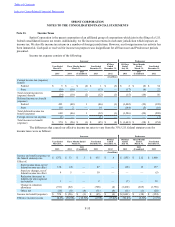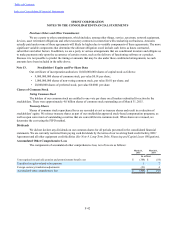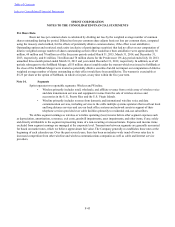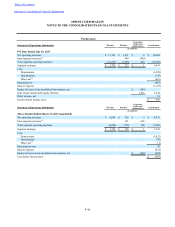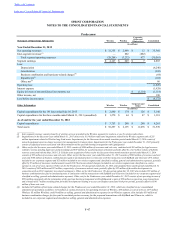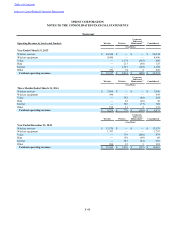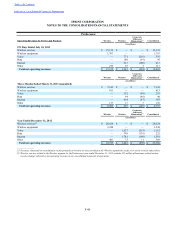Sprint - Nextel 2014 Annual Report Download - page 123
Download and view the complete annual report
Please find page 123 of the 2014 Sprint - Nextel annual report below. You can navigate through the pages in the report by either clicking on the pages listed below, or by using the keyword search tool below to find specific information within the annual report.
Table of Contents
Index to Consolidated Financial Statements
SPRINT CORPORATION
NOTES TO THE CONSOLIDATED FINANCIAL STATEMENTS
F-40
Sprint is currently involved in numerous court actions alleging that Sprint is infringing various patents. Most of
these cases effectively seek only monetary damages. A small number of these cases are brought by companies that sell
products and seek injunctive relief as well. These cases have progressed to various degrees and a small number may go to
trial if they are not otherwise resolved. Adverse resolution of these cases could require us to pay significant damages, cease
certain activities, or cease selling the relevant products and services. In many circumstances, we would be indemnified for
monetary losses that we incur with respect to the actions of our suppliers or service providers. We do not expect the
resolution of these cases to have a material adverse effect on our financial position or results of operations.
In October 2013, the FCC Enforcement Bureau began to issue notices of apparent liability (NALs) to other
Lifeline providers, imposing fines for intracarrier duplicate accounts identified by the government during its audit
function. Those audits also identified a small percentage of potentially duplicative intracarrier accounts related to our
Assurance Wireless business. No NAL has yet been issued with respect to Sprint and we do not know if one will be issued.
Further, we are not able to reasonably estimate the amount of any claim for penalties that might be asserted. However, based
on the information currently available, if a claim is asserted by the FCC, Sprint does not believe that any amount ultimately
paid would be material to the Company’s results of operations or financial position.
Beginning in early 2012, a group of state attorneys general began an investigation into the practice of wireless
carriers including on their bills charges for certain content from third-party providers, particularly premium short message
services, and the measures taken by carriers to ensure that such charges were appropriately authorized. Late in 2013, the
Consumer Financial Protection Bureau (CFPB) also began a separate investigation into the issue, and the FCC began its own
investigation in mid-2014. In July 2014, the Federal Trade Commission (FTC) brought suit against T-Mobile, alleging that it
included unauthorized charges on its bills; in December 2014, T-Mobile entered into a settlement agreement with the FTC,
FCC and state attorneys general. In October 2014, the FTC, FCC and states announced a settlement with AT&T regarding
third-party billing issues. In December, 2014, the CFPB brought suit against Sprint regarding third-party billing issues. On
May 6, 2015, we entered into agreements with the FCC, CFPB, and various states to settle all issues involved in the
investigation for an amount not material to the Company's results of operations or financial position.
Various other suits, inquiries, proceedings and claims, either asserted or unasserted, including purported class
actions typical for a large business enterprise and intellectual property matters, are possible or pending against us or our
subsidiaries. If our interpretation of certain laws or regulations, including those related to various federal or state matters such
as sales, use or property taxes, or other charges were found to be mistaken, it could result in payments by us. While it is not
possible to determine the ultimate disposition of each of these proceedings and whether they will be resolved consistent with
our beliefs, we expect that the outcome of such proceedings, individually or in the aggregate, will not have a material adverse
effect on our financial position or results of operations.
Spectrum Reconfiguration Obligations
In 2004, the FCC adopted a Report and Order that included new rules regarding interference in the 800 MHz band
and a comprehensive plan to reconfigure the 800 MHz band. The Report and Order provides for the exchange of a portion of
our 800 MHz FCC spectrum licenses, and requires us to fund the cost incurred by public safety systems and other incumbent
licensees to reconfigure the 800 MHz spectrum band. Also, in exchange, we received licenses for 10 MHz of nationwide
spectrum in the 1.9 GHz band.
The minimum cash obligation under the Report and Order is $2.8 billion. We are, however, obligated to pay the
full amount of the costs relating to the reconfiguration plan, even if those costs exceed $2.8 billion. As required under the
terms of the Report and Order, a letter of credit has been secured to provide assurance that funds will be available to pay the
relocation costs of the incumbent users of the 800 MHz spectrum. The letter of credit was initially $2.5 billion, but has been
reduced during the course of the proceeding to $406 million as of March 31, 2015. Since the inception of the program, we
have incurred payments of approximately $3.4 billion directly attributable to our performance under the Report and Order,
including approximately $157 million during the year ended March 31, 2015. When incurred, substantially all costs are
accounted for as additions to FCC licenses with the remainder as property, plant and equipment. Although costs incurred
through March 31, 2015 have exceeded $2.8 billion, not all of those costs have been reviewed and accepted as eligible by the
transition administrator. During the year ended March 31, 2015, we received a cash payment of approximately $95 million
which represented a reimbursement of prior reconfiguration costs incurred by us that also benefited spectrum recently
auctioned by the FCC. We do not expect any further reimbursements.







